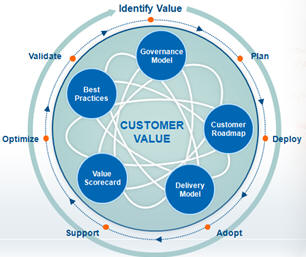Provide real value of PLM through professional service
To know more background of PTC global service, I interviewed Mr. Matt Toolan, Director of Market Strategy, Global Services at PTC via e-mail.
In October 2010, PTC was named as the winner of the Fall 2010 Technology Services Industry Association (TSIA) STAR Award for Overall Operational Excellence in Technology Professional Services. The award recognized PTC for achieving exceptional organizational maturity across all areas of the professional services business. These include developing people, building customer relationships, and delivering high quality services to customers. To know more background of PTC global service, I interviewed Mr. Matt Toolan, Director of Market Strategy, Global Services at PTC via e-mail.

Mr. Matt Toolan, Director of Market Strategy, Global Services at PTC
Pei Huang: What’s your comment of getting the STAR awards of TSIA?
Matt Toolan: PTC Global Services is honored to be recognized by the TSIA for this award. This award is a testament to the hard work of our people to ensure that our clients receive the most value from their PTC implementations.
Pei: Please introduce the organization structure of PTC global service team.
Matt: Global Services is structured around ensuring customer’s success in product development. Marc Diouane is the Executive Vice President of Global Services. Reporting to Marc are:
1)Carlos Damasceno – Divisional Vice President of Global Services. Carlos is responsible for the worldwide business management of global services including: sales, delivery management and project management.
2)Kurt Kuelz - Divisional Vice President of Global Services. Kurt is responsible for the overall consulting staff, capacity management, staff development, and delivery methodology
3)Matt Cohen - Divisional Vice President of Global Services. Matt is responsible for PTC University, which develops and delivers all customer training as well is responsible for consulting on PTC’s desktop products
4)Sanjay Verma - Divisional Vice President of Global Services. Sanjay is responsible for global services financial operations, forecasting, strategy, marketing and communications.
Pei: Please introduce the PLM project implement strategy of PTC. How could PTC ensure the successful implementation of PLM project and realize real value?

Matt: Just like this figure. We firmly believe that customers that focus on and measure the business value of their PLM are more successful than those that don’t. Working from the outer ring in, any software project should be focused delivering value (return) to the organization at all phases: Identify, Plan, Deploy, Adopt, Support, Optimize, and Validate. To PTC, this is the minimum expectation a customer should have.
For those customers with a more complex product development strategy that involves many different groups or distributed teams, we recommend a more strategic approach to realizing value. Purchasing, implementing, and adopting integrated, enterprise solutions takes a concerted effort both internally and with their selected solution provider. That’s why PTC’s single goal is ensure maximum value of a PTC investment and successful customer experience through a unique, highly collaborative engagement process.
PTC Global Services has developed a set of frameworks and best practices that provides expert guidance through, every stage of a customer’s PLM strategy. This includes:
- Value Scorecard – No major project within an organization should be attempted without clear financial, technical, operational, and program metrics to guide decision-making and measure performance. PTC Global Services professionals work with the customer to determine the right metrics based on the customer’s unique business needs, project objectives, and our experience. These metrics will determine how value is derived from PTC solutions throughout every stage of the Customer Experience.
- Customer Value Roadmap – Taking into consideration the business objectives and the metrics in the Value Scorecard, PTC then builds a personalized value roadmap, which aligns best practices, processes, people and metrics based on current and future needs and capabilities. The Customer Value Roadmap is critical to managing decision making internally and across divisions.
- Best Practices –PTC recognizes that the best way to achieve product development management goals is to take an incremental, targeted approach to improving product development process. PTC has broken down product development into a set of critical best practices that can actually be implemented and can help customers improve processes and achieve goals.
- Program Governance – Successful enterprise deployments require a close partnership between customers and PTC Global Services. This relationship involves close relationships at all levels – Executive teams, Steering Committees, and Project Managers. By utilizing our proven program governance model, these multi-level relationships, ensure alignment of business strategy with technical requirements, and provide the right levels of oversight to ensure success.
- Proven Delivery model – PTC Global Services has a proven approach to ensuring customers are successful with PTC software, which we call the Realized Value Platform (RVP). The RVP is based on the concept that customers should achieve real, measurable value from each step in the implementation process and from the process as a whole. Examples include:
1.Process Analysis - deep analysis of current processes and the creation of the planned “to be” processes and the impact of technology on those processes
2.System design – what is the infrastructure required to support the users and their data
3.Data migration plans and testing (if necessary) – customer with large amounts of existing data need a method to migrate that data to the new system without loss of critical information
4.Initial deployment of the solution
Combined, these are the key elements to deploying a successful PLM implementation and make PTC Global Services uniquely capable of enabling clients to realize value from Enterprise PLM through Strategic Partnership between Client & PTC
Pei: How could PTC global service team meet the different needs of manufacturing companies in different industries, different locations and in different culture background?
Matt: We understand that every customer is different in what they do, as that is what makes them competitive. So we approach each customer as a unique entity, with unique strengths and opportunities. That said, PTC Global Services focuses on a core set of vertical markets – Aerospace & Defense, Automotive, Electronics & High Tech, Industrial, Medical Devices, and Retail and Consumer Goods and broad experience in many others. We have built expertise in these areas based on the 25 years we have been working with clients and have strong understanding of the different business pressures on different verticals. As far as culturally, we work as a global team. In most cases, we use local resources to work with clients at their locations. Our 1000 consultants are located around the world to stay close to our customers.
Pei: How could PTC global service team accumulate the experience and know-how of PLM implementation?
Matt: Over the past 25 years we have worked with hundreds of product development organizations around the world, including some of the largest and most innovative. Companies like Airbus, Toshiba, Toyota, Hitachi, Samsung, Caterpillar, Adidas, Mitsubishi, and Volvo Truck. At the same time, we are part of PTC - the leaders in PLM technology. These two things enable us to develop our people to learn from past implementations, develop new working methods and share knowledge across the organization.
Pei: How could you make the balance of customer satisfaction and the profitability of your global service team?
Matt: By focusing our efforts on customer value, that puts their satisfaction (and success) at the center of our objectives. We need to do things right. The value centric methodology keeps customer satisfaction part of the on-going engagement, so we can take corrective action along the way, rather than waiting for a major problem. By using this approach and building lasting, long-term relationships with customers it is easier to keep a balance between satisfaction and profitability.
Pei: How do you cooperate with other consulting firms?
Matt: PTC Global Services has many partners around the world. These range from large system integrators like IBM and Accenture, to small, local firms that can help us build extra capacity as needed to meet customer needs. In all cases, we work to understand each organization’s role in ensuring customers realize value from their PTC solution.








